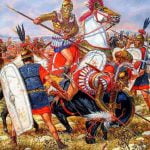Hannibal was over 40 years old after the end of the Second Punic War. After signing the humiliating peace, Hannibal decided to focus on politics. He was elected a shofeṭ, the highest government official, with strong executive power and considerable legislative and judicial powers. As a result of his efficient reforms, seven years after the battle of Zama (202 BCE), Carthage was “rising from its knees”.
This fact did not go unnoticed. Concerned Romans began to demand Hannibal’s resignation. Roman intrigues eventually forced Hannibal to go into exile on his own will. The Carthaginian leader first went to Tire – the original homeland of the Carthaginians, then to take refuge at the court of the Seluceus ruler Antiochus the Great. The Syrian ruler was preparing for the war with Rome, and Hannibal offered him help and command of some of the troops. Ultimately, Antiochus III did not give Hannibal any significant office, but he did appreciate his opinion.
An interesting discussion of both leaders was quoted before the battle of Magnesia (190 BCE). Antioch, proud of his powerful and richly decorated army (elephants with shooting towers, chariots with scythes, infantry with silver shields, riders on golden saddles) asked Hannibal: “Will this be enough for the Romans?” Hannibal was to answer: “I think all this will be enough, yes, quite enough, for the Romans, even though they are most avaricious”.
After the defeat at Magnesia, Antioch made peace with the Romans, who demanded the release of Hannibal. This, however, gave him a chance to escape.







